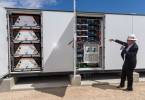Solar panels good deal for Moapa tribe
Take the Valley of Fire exit off Interstate 15 north of Las Vegas, and you can’t miss the sign welcoming visitors to the Moapa Tribal Travel Center. It reads, “Tax Free.”
The Moapa Band of Paiute Indians owns and operates a sprawling center, which features an enormous smoke shop, fireworks emporium and liquor store, with a cafe, convenience store and gas station. At the center, liquor and tobacco sales aren’t taxed the way they are in your local supermarket.
These days, that’s where the “tax free” theme ends.
Out behind the travel center, enormous solar panels soak up the April rays. The panels provide electricity to the tribe’s roadside business and figure to annually save it many thousands in diesel fuel costs.
But those solar panels weren’t conjured by Paiute elders. They came with a $2.38 million price tag courtesy of a U.S. Department of Agriculture High Energy Cost Grant program. The grants are awarded to energy efficiency programs in areas where energy costs are 275 percent above the national average, according to the USDA.
The tribe figures to save a considerable bundle: nearly $700,000 in annual fuel expenses, according to the federal administration. The hybrid system is considered off-grid and self-contained, meaning it isn’t hooked up to a larger system.
If that estimate is accurate, the clean system will technically pay for itself in less than a decade. Not that the tribe is expected to repay the grant.
For USDA Rural Utilities Service Administrator John Padalino, the project is a win-win for the government’s promotion of rural renewable energy and for the tribe.
“The Moapa Paiutes Tribe’s solar project is the latest step toward building a clean energy economy,” Padalino said in a news release. “This innovative hybrid micro-grid project will deliver reliable, affordable power to the Moapa Travel Plaza, the largest employer of the tribe. USDA funding of this innovative 252 (kilowatt) solar facility is fundamental to economic opportunities of the Moapa Tribe and aligns with their commitment to environmental protection.”
But you could hardly be blamed for wondering whether spending $2.38 million for a solar system to power a mega-smoke shop and liquor store is a wise use of federal dollars. From the perspective of the USDA and Moapa tribe, it’s a no-brainer.
Although it’s easy to chide, the size of the center’s solar system is a lot more cost-effective than trying to hook up to a larger grid that’s not yet on line. (The Moapa tribe also has embraced a large-scale solar power plant that relatively recently left the drawing board.) Smaller systems appear to make more sense from a practical use standpoint.
The larger Moapa project is the first utility-scale solar power project to be developed on tribal land. The Moapa Solar Energy Center will cover up to 1,000 acres and produce approximately 200 megawatts of solar energy. The tribe, according to its Environmental Impact Statement, will reap economic gains in partnership with First Solar. And it doesn’t hurt that Senate Majority Leader Harry Reid has taken a keen interest in seeing the tribe’s project become a success.
The larger power plant already has received a boost in the form of an energy purchase agreement with the Los Angeles Department of Water and Power, and the facility’s presence on the reservation will no doubt bring several changes to the tribe. Meanwhile, the travel center’s relatively modest solar project is ready to light the business and its signage.
Some will consider it a waste, but in Nevada and throughout the rural West, USDA programs and grants make an enormous difference in the quality of life of citizens on and off the grid.
John L. Smith’s column appears Sunday, Tuesday, Wednesday, Thursday and Friday. Email him at Smith@reviewjournal.com or call 702-383-0295. Follow him on Twitter @jlnevadasmith.




























